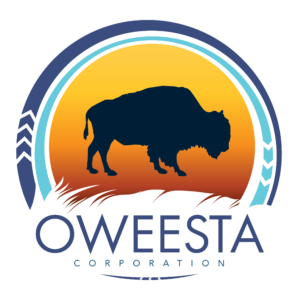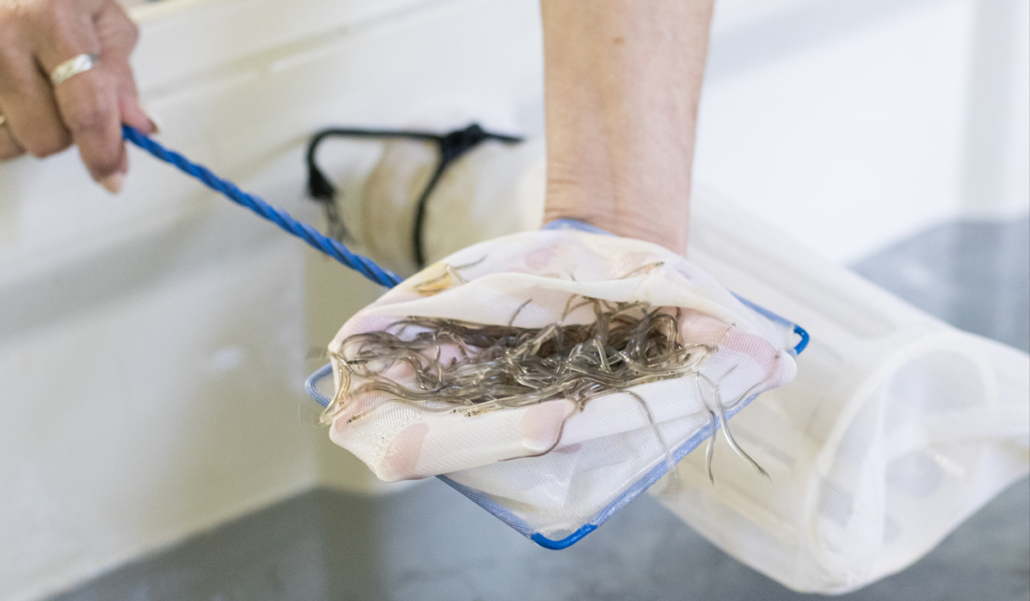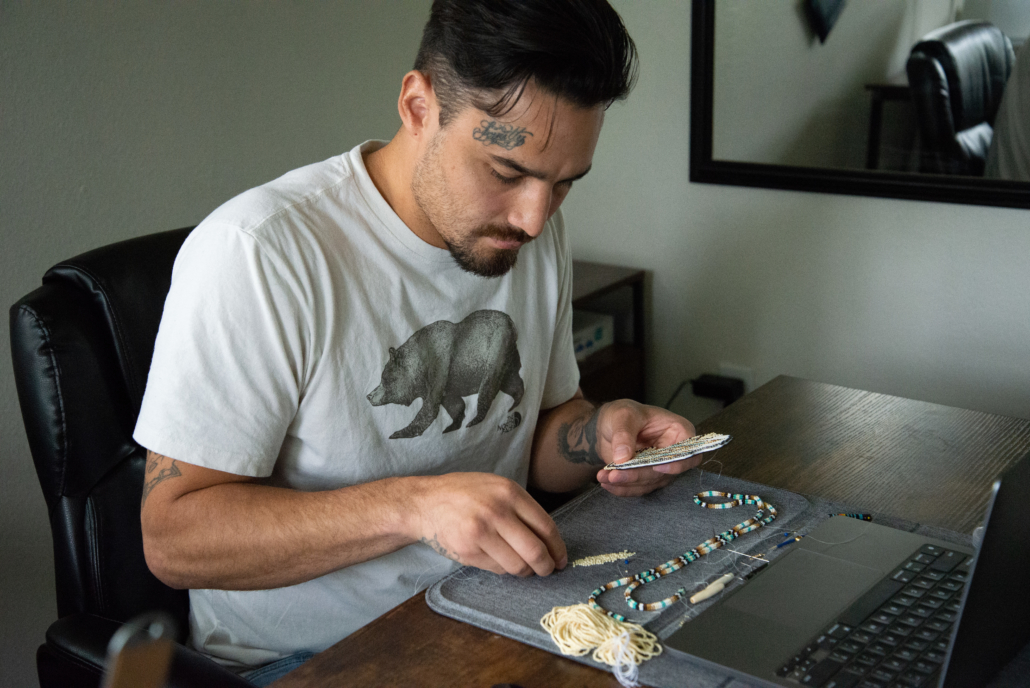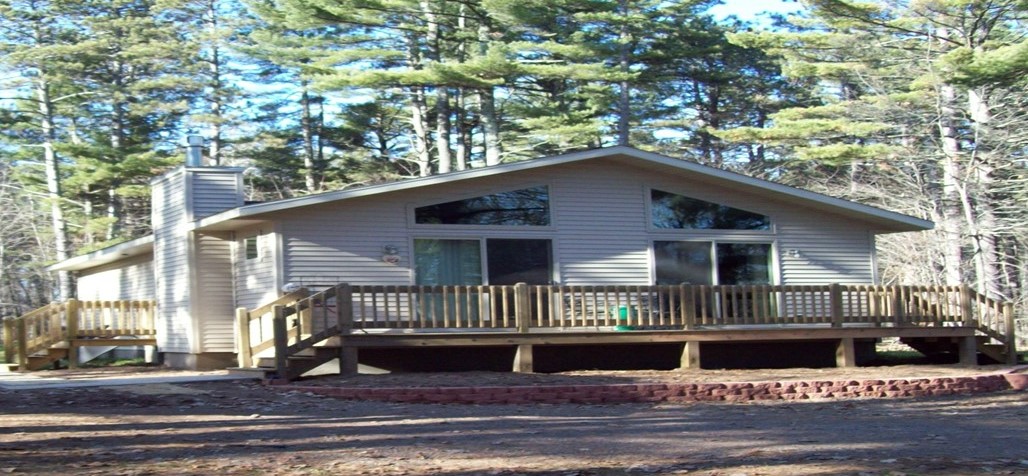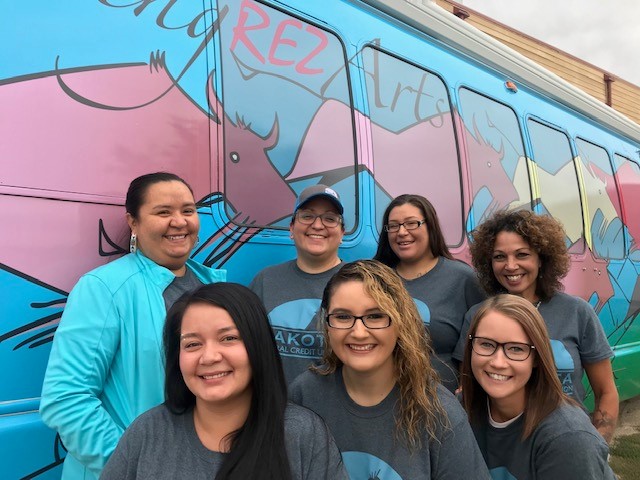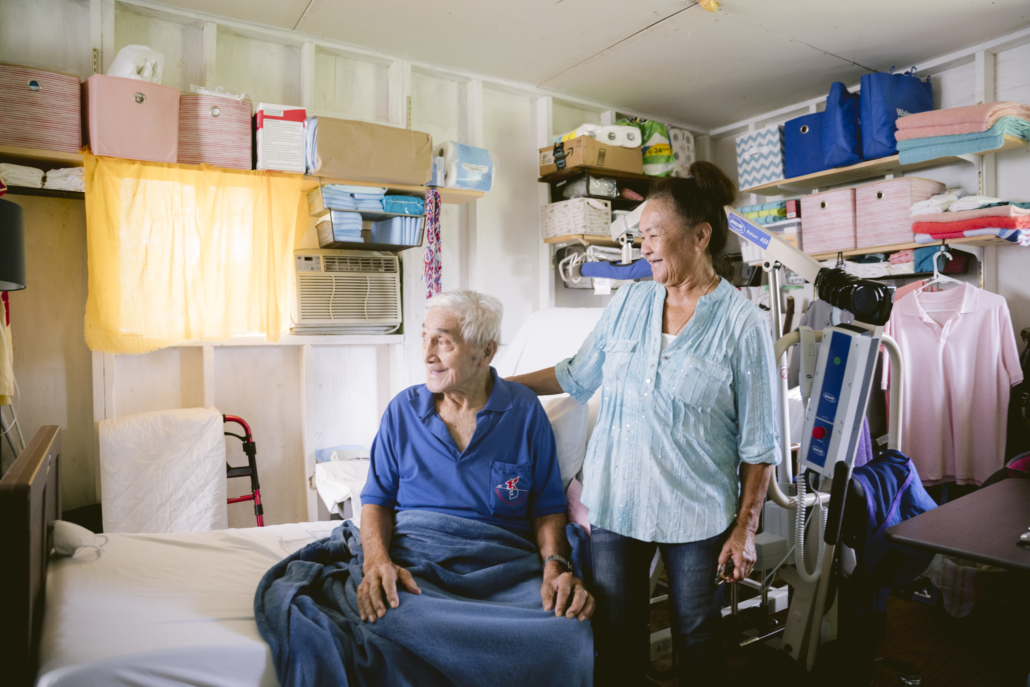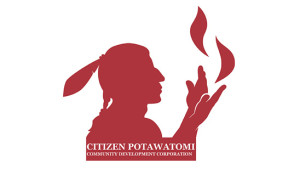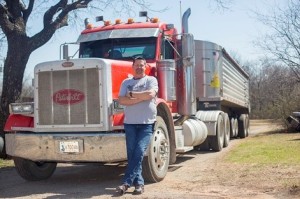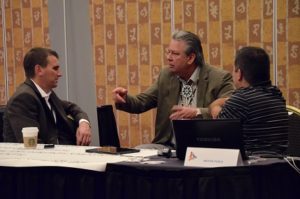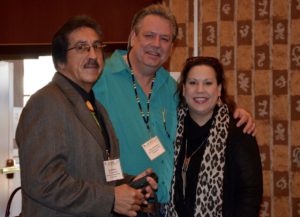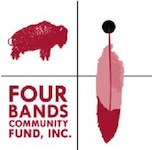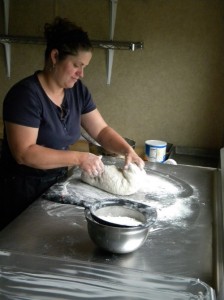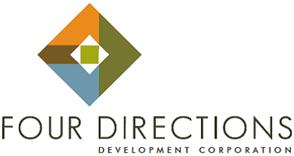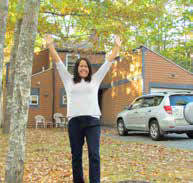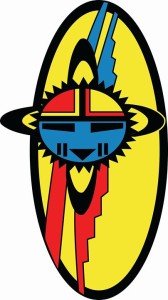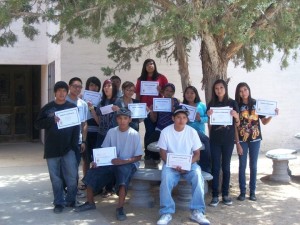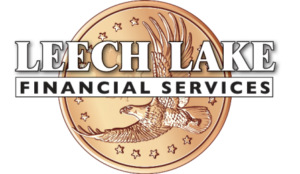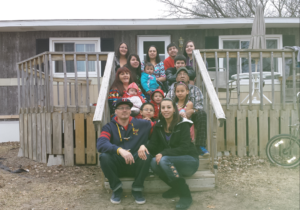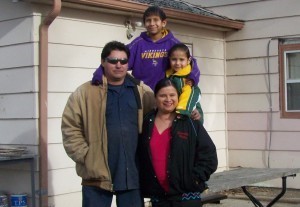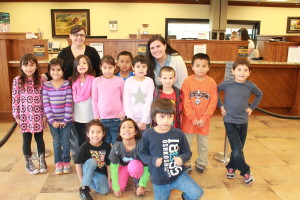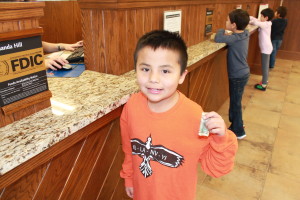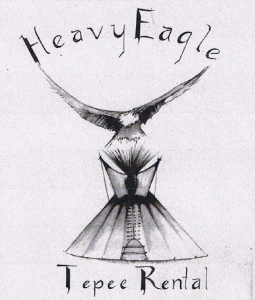From Rolling Hills to Rolling Wheels: Z&W Trucking
In far northeast Oklahoma, Hulbert is known for its rolling hills and rich cultural heritage. It’s a tight-knit, welcoming community where 30-year olds Zach and Rachel Weeks have chosen to raise their young family and turn their passion for trucking into a thriving business.
Zach, a member of the Peoria Tribe, and Rachel, who is Otoe-Missouria, have forged close relationships in the small town and embarked on a remarkable journey, founding Z&W Trucking together.
Their story is a testament to resilience, community support, and the power of trust, evidenced by the relationship the Weeks formed with Local Bank Hulbert, a Native-owned, female-owned CDFI dedicated to serving rural, Native American and underserved communities.
Decolonizing Food Systems In Maine
“We sealed the eel deal,” Tawny Wilson, Loan Officer at NDN Fund shared a joke popular within the NDN team. After three years of working closely with the Indian Township Enterprise (ITE), the economic development arm of the Passamaquoddy Tribe, NDN Fund and ITE closed out a $1.5M loan to support a joint venture in the eel aquaculture business.
Eels have been a traditional food source of the Passamaquoddy Tribe of Maine for centuries and more than half of community members harvest baby eels, called elvers, each spring. However, the community has faced financial exploitation over their harvests – harvesters would regularly be paid half of the market value for their catch, only to see the price double.
Turning Beads into a Business in Rapid City
When Black Hills Community Loan Fund opened applications for their new program “Pivoting in a Pandemic,” they received 200 applications within three days for only twenty openings.
Beau, a beadwork artist based in Rapid City, South Dakota, landed one of the coveted spots that would help him “pivot” his fledgling beading business to e-commerce. Beau was born in Rapid City and grew up on the Pine Ridge Indian Reservation, where he learned beading techniques from local artists and mentors. It was while in prison that he focused on honing his craft as a form of expression, identity, and cultural history.
Making Forever Homes Possible in Lac du Flambeau
Patti Maulson was ready to rebuild her life after going through a divorce that left her bankrupt. A tribal member of the Lac du Flambeau Band of Lake Superior Chippewa tribe, she decided to return home to the reservation and become a homeowner once more.
With the bankruptcy fresh on her credit report, she couldn’t qualify for a loan through most banks. That’s when she reached out to Wisconsin Native Loan Fund (WINLF), a local Native CDFI servicing all eleven Tribes in Wisconsin. In a letter, Patti laid out the circumstances that led her to declare bankruptcy and the reparative steps she had been taking since then to rebuild.
The Rolling Rez: Giving “Mobile Banking” a New Meaning
Every two weeks, on Tribal Pay Days, when the Tribe (the largest employer on the Pine Ridge Reservation) disperses paychecks, a brightly painted bus pulls up. The Rolling Rez is a bank on wheels that travels the fifty miles from Kyle to Pine Ridge, South Dakota, and services Tribal employees with their banking needs. People have access to cash, deposit their paychecks, sign loan documents, open accounts – virtually everything a local branch does.
The Rolling Rez bus is a joint initiative started in 2012 by Lakota Federal Credit Union, Lakota Funds, First Peoples Fund, and Artspace that brings banking to people. The Pine Ridge Reservation, a sprawling community 70 miles wide, covering more than 2.8 million acres of land, is home to more than 28,000 people. “We like to say the rez is about twice the size of the state of Delaware,” said Shayna Ferguson, CEO and President of Lakota Federal Credit Union (LFCU). Unlike Delaware, which has 36 banks with over 200 branches scattered throughout the state, Lakota Federal Credit Union is the first and only federally-insured banking institution on the reservation.
Rebuilding in Hawai’i
In May 2018 the Kīlauea Eruption on the Big Island of Hawaiʻi left devastation and destruction in its path: 2 dead, 24 injured, and at least $800 million in property damage. Volcanic gas and earthquakes forced the evacuation of populated areas and destroyed houses, roads, and utilities. While the eruption first happened May 3, it was active and expanding every day until it ended on September 4, 2018. It was after this four-month period of destruction and loss, that Hawaiʻi Community Lending (HCL) first met William and Barbara.
Native Hawaiian, William shared how he and his wife Barbara had lost everything including the home he built with money he pieced together over decades. Although a veteran, he was never able to purchase a home through the Veterans Administration mortgage program or any other loan program because of the cost of living and housing in Hawaiʻi are unaffordable for the very low-low-income families.
Chehalis Tribal Loan Fund
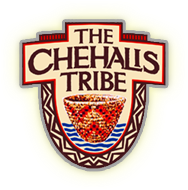
The Chehalis Tribal Loan Fund provides loans to Firework Stand Owners on the Chehalis Reservation. This year they were able to provide 36 Firework Loans. This assisted stand owners in capital needed for inventory, wages, and buildings. Here is a quote from one of their Firework stand owners: “The CTLF has been great to work with! They have helped me not only consolidating my debt last year, but also helped with a small business loan this year. They offer great opportunities for tribal members to become financially stable. I look forward to utilizing CTLF for years to come”, states owner of BlackMagic Fireworks.
Citizen Potawatomi Community Development Corporation
Starting a new business is always a daunting prospect, while maintaining steady growth is an entirely different matter with its own set of challenges. Mark and Cindy Cheatwoods’ Shawnee-based small business, MC Trucking, has taken on those obstacles and more. Open since 2006, the business has navigated challenges like the 2008 financial crisis and rising fuel costs. MC Trucking has overcome these challenges and prospered because of the support of the Citizen Potawatomi Nation Community Development Corporation, a tribally chartered non-profit providing capital and technical assistance for Native American-owned businesses. MC Trucking is one of 58 businesses the Citizen Potawatomi Community Development Corporation has helped to fund in Pottawatomie County since 2003. “I had a chance to buy a truck and was looking for a change, career wise, after 18 years at Central Plastics,” said Mark Cheatwood. “I drove a truck when I was younger, so when the opportunity came along to buy one, the next question was ‘How can I finance it?’” Cheatwood’s niece had secured financial assistance for a new home through the Citizen Potawatomi Nation due to their family’s membership in the tribe. Mark and Cindy thought that given his tribal citizenship, he might be eligible as well. After some initial conversations, Mark and Cindy, who is also his business partner, found themselves seated in the offices of the Citizen Potawatomi Community Development Corporation with Assistant Director Cindy Logsdon. “I had to cash in my 401k from my previous job to pay off our bills, but I still needed financing to purchase the truck,” explained Cheatwood. “I’d have had to go through a bank or figure something else out if it hadn’t been for the CPCDC and Cindy Logsdon.” With the assistance of CPNCDC, MC Trucking got rolling in 2006. Initially taking on assignments with Wewoka, Okla.’s Falcon Materials, the Cheatwoods eventually took on more customers in and around Pottawatomie County due to the operation’s quality of work. The small business hauls rocks, gravel and dirt from quarries across central Okla. for customers, large and small alike. Still a one-truck operation, the business has paid off the CPCDC’s initial investment and only owes a small amount on the third of its three trailers. Looking back on that first big step in Mark leaving a steady job with benefits and a 401k, the Cheatwoods acknowledge the chance they took in striking out on their own. “I was real leery about getting into it,” said Cheatwood as he motioned to his wife and co-owner Cindy while laughing. “She was even more leery than I was. We stared off slowly, but we kept growing and haven’t looked back since.”
First American Capital Corporation and American Indian Chamber of Commerce Wisconsin
Expanding Loan Products & Development-Services Delivery through Collaborations & Resource Networks
Native-owned businesses and business startups in Wisconsin have a true ally in First American Capital Corp (FACC). As a certified Native CDFI and SBA Microlender, FACC is the sister organization of the American Indian Chamber of Commerce of Wisconsin (AICCW). The AICCW was formed in 1991 in response to a core group of American Indian business owners who started this 501(c)(3) as a nonprofit membership organization that could advocate, organize, network, deliver business development services and otherwise represent the needs and demands of business owners and entrepreneurs throughout Wisconsin.
In 2001 a group of Native American business owners and active members of AICCW began to investigate forming an alternative, direct business-lending program in response to access-to-capital barriers experienced by Native entrepreneurs when attempting to obtain start-up and expansion loans from banks in both urban areas as well as at reservation business locations.
Given the established working relationships of AICCW with state government program representatives, the AICCW was successful in obtaining seed capital – both revolving loan funds and operating capital – from the then Wisconsin Department of Commerce (survived by the current Wisconsin Economic Development Corporation). This initial AICCW Revolving Loan Fund organization was later split off from AICCW to form First American Capital Corporation, Inc. as a separate 501(c)(3). However, FACC retains a strategic relationship with AICCW to work in conjunction on the shared mission-driven focus of providing Native-owned businesses with access to capital, technical assistance, networking with essential business-development resources, and advocacy designed to build capacity and wealth in Wisconsin Indian business communities.
The FACC was first certified as a Native CDFI in 2004 and then in 2007 became the first Native SBA Microlender in Wisconsin. The FACC is fortunate to have a consistent, active, and engaged board of directors representing enrolled members of five different tribal nations – including some of the most successful Native business owners and tribal enterprise CEOs in Wisconsin. The FACC, like its sister organization, is not directly associated with any one tribe. This provides independence and objectivity in the delivery of our collective loan products and development services. Currently three employees allocate time between AICCW and FACC operations. FACC has about $3million in assets and is following a strategic growth plan that aims to reach $5million by 2019.
The AICCW and FACC Milwaukee County location not only facilitates representation of the significant percentage of American Indian-owned businesses located off reservations, but this urban location is close to the offices of local, state, and federal government program representatives and key corporate/funding organizations. The FACC has developed ready access and positive working relationships with essential business/economic development decision makers and resources in Wisconsin, leading to diverse funding partners including foundations, banks, city agencies, state agencies, tribal partners, and federal programs designed to provide financial assistance and development services support for intermediary lenders. Most recently FACC entered into a strategic collaboration with three of the largest certified non-Native CDFIs in the state – named Invest In Wisconsin – with initial funding provided by JP Morgan-Chase Partnerships for Raising Opportunity in Neighborhoods program initiative.
Equally important is the broad local, state, tribal, federal business-development resources network in which FACC participates and assists in delivering to Wisconsin Indian Country entrepreneurs and Native business owners. Close working relationships advanced by FACC now include, for example, direct access to the Wisconsin Department of Transportation (WisDOT) – DBE Support Services and the WisDOT Inter-Tribal Task Force (see: http://wisdottribaltaskforce.org/ ).
The most notable collaboration is the growing Wisconsin Indian Business Alliance (WIBA) which includes the four certified Native CDFIs in Wisconsin: First American Capital Corp, First Nations Community Financial, Northwood NiiJii Capital Partners and the Wisconsin Native Loan Fund. The WIBA strategic partners include the Great Lakes Inter-Tribal Council – Small Business Technical Assistance Program, the Wisconsin Economic Development Corporation and the Federal Reserve Bank of Minneapolis. Working together as WIBA, it is now effectively delivering a continuum of development services and loan products throughout Wisconsin Indian Country – including both on and off federally recognized reservation community. See the following link for additional information: http://wisdottribaltaskforce.org/labor-business/native-owned-business-resources/
The mission of First American Capital Corporation (FACC) is to perform economic development activities that benefit Wisconsin’s Indian Country by increasing access to capital in the form of business loans, providing technical assistance services that strengthen the skills of Native entrepreneurs, and by advocating for Indian owned businesses to create new business opportunities — both on and off federally recognized reservations.
For additional information contact Craig Anderson, AICCW President/FACC Executive Director at craiga@aiccw.org or 414.604.2044 and visit: http://www.faccloans.com/
Four Bands Community Fund
Today’s society is a far cry from the lifestyle our grandparents – or even parents – led. These days we have more gadgets than ever to help us increase communication and save time. Cars have replaced the horse. Cell phones and email are replacing the U.S. Postal Service. Heck, we even have machines that wash our dishes for us. But ironically, today’s average American is busier than ever with less free time than the previous generation. In fact, according to a recent poll by Gallop, the average full-time work week is 47 hours. So it’s no surprise that the simple pleasures in life – like home baked bread – have gone by the wayside. But this is something that Robi Miller of Timber Lake, South Dakota hopes to change with the start-up of the Daily Bread Bakery. Miller, a mother of four and wife to the owner of a construction company, understands how the demands of life can eat up your time. “We know that people don’t have time to bake anymore, so we are here to do it for them,” she says. “Plus, homemade is just better tasting, and it’s better for you.” The Daily Bread Bakery, located on the prairie of the Cheyenne River Indian Reservation, offers homemade breads, rolls, pastries, and decorated cakes that don’t include the myriad of preservatives, artificial flavoring, and coloring that the mass-produced baked goods on the store shelves are drowning in. While considered harmless by most, others believe that preservatives that slow the natural ripening process of foods can have side effects such as increased risk of cancer, hyperactivity in children, and reduced heart health. In just the few short months since it’s opening, the Daily Bread Bakery has expanded its target market from the general population to local restaurants and businesses. Miller attributes some of this success to Four Bands Community Fund who has helped promote her business through a ribbon cutting ceremony during her grand opening and advertising through listing her business on their online business directory. Miller comments, “There is more than just financial support in working with Four Bands. Even just the encouragement from the staff there was really good for me, and after talking with them it sparked ideas and things that I could do to make the bakery better.” Miller initially contacted Four Bands to explore financing options, but found there were other services, such as business coaching, she could utilize to support the start-up of her business. “They helped me stay positive during that first big push to get open and get rolling when you are just tired and hoping you can do what you set out to do. Having somebody stop by with a smile on their face asking how it is going and really caring was a tremendous blessing to me,” says Miller. Although there are many challenges in operating a business in a rural location, Miller says there are also many benefits. She says that the people in small communities are the best to work with and want you to succeed. “They allow you to make mistakes and fix them. They don’t dismiss you quite as quickly as larger communities where people can just move onto the next company doing the same thing you are,” Miller states. All in all, the launch of the Daily Bread Bakery is a win-win for the Cheyenne River Indian Reservation. Robi Miller provides home baked goods and simple pleasures that our busy daily life can’t afford. The community provides her the encouragement she needs to keep baking. And then it circles around again…
Four Directiond Development Corporation
Prior to applying for financing from Four Directions Development Corporation (FDDC), Awendela Dana was not aware of any lending options for on-reservation properties. She heard about FDDC through word-of-mouth from other tribal members on Indian Island. Ms. Dana’s initial reaction was that FDDC was an innovative approach to allow tribal members an opportunity to purchase, improve, and access equity from, residential properties located on-reservation.
In mid-2004, Ms. Dana and her significant other, applied to FDDC for financing to purchase a single family home on Burnurwurbskek Lane on Indian Island. Recent graduates from the University of Maine, they were eager to have a home of their own within the community. It was a private sale from another tribal member for $43,000. Down-payment assistance was provided by the Penobscot Nation. The loan closed on November 9, 2004 and the payments were affordable for a young couple starting out in their professional careers. “Tribal people have a hard enough time; most will never own a home. Four Directions is able to make homeownership a reality.”
In 2008, Ms. Dana returned to FDDC to refinance the loan into her name only. She had recently graduated from the University of Maine with a Masters Degree in Social Work. FDDC approved the refinancing request and it closed on August 7, 2008. Ms. Dana was thrilled, “it was all mine and in my community! My mother taught me the importance of being able to take care of oneself and to not be dependent on anybody. It is so important to take care of yourself and be able to provide for your family. In the fall of 2013, Ms. Dana returned to FDDC to request a home improvement loan to replace her roof. FDDC approved the request and closed a home improvement loan on January 14, 2014.
During the summer of 2014, Ms. Dana contacted FDDC staff to inform them of an upcoming medical procedure for her young daughter. FDDC was able to provide a deferment of loan payments for both of her loans so she could focus on her daughter’s health and full recovery. FDDC crafted the deferment of payments so this family medical emergency would not have lasting consequences on Ms. Dana’s finances and credit. Ms. Dana was extremely happy with how FDDC helped her during this time. “Having a child with special medical needs – getting help and support from the tribe and from Four Directions is amazing!”
Staying in the community provides Ms. Dana with a feeling of safety. Her neighbors are her family members. Each weekend, she cooks breakfast for her mother and most of her family is right within walking distance from her home. “This is more than a house; you have a place within your community.”
Ms. Dana is the Child Support Program Coordinator for the Penobscot Nation Child Support Enforcement Department and she “LOVES FOUR DIRECTIONS! She is extremely thankful for all of the help FDDC has provided.
Hopi Credit Association
The Hopi Credit Association was formed on May 1, 1952, by a group of Hopi Individuals as a re-lending program to members of the Hopi Tribe. The Hopi Credit Association’s goal is “To carry out the business of borrowing money, and re-lending it to members for their economic improvement and activities related thereto”. Each year, Hopi Credit Association holds a Financial Literacy Camp for Hopi youth enhancing the financial education of our tribal members from an early age.
Indian Land Capital Corporation
On April 13, 2011 the Yurok Tribe finalized the purchase of 22,237 acres of land from Green Diamond Resource Company in Humboldt County, California. The land, part of the Yurok’s aboriginal territory, will be sustainably managed for clean water and forest health.
The deal is the result of 23 years of negotiations between the Tribe and the timber company to recover the land, starting with the Hoopa/Yurok Settlement Act of 1988. The Tribe worked with several partners, including the Western Rivers Conservancy, the State Water Resources Control Board (SWRCB) and the Indian Land Capital Company, to complete the purchase. In December of 2010, the SWRCB voted to authorize $18.75 million in financing for the Yurok Tribe to purchase the land.
Indian Land Capital Company provided the Yurok with a $1 million bridge loan in 2009, and an extension of the loan through a line of credit in early 2011. This allowed the Tribe to make a good faith purchase of 5,500 acres from the seller as they waited for the state financing to come through.
The land purchased will become a Yurok Tribal Community Forest. The Tribe plans to use a sustainable forestry management approach that will protect salmon, improve water quality and restore meadows that traditionally supported subsistence hunting and gathering.
In addition, the Tribe will work to further enhance three tributaries to the lower Klamath River that flow through the property: Pecwan, Ke’pel and Weitchpec Creeks. These creeks provide vital cold water and spawning grounds for the many anadromous Klamath fish species.
This land purchase is the first in a multi-phase land acquisition project. In Phase II, the Tribe plans to purchase an additional 25,000 acres, including the lower watershed of Blue Creek, a stream that is sacred to the Yurok and essential to the survival of Klamath River salmon.
Leech Lake Financial Services
Leech Lake Financial Services
“From Renter to Owner:
Using Financial Training to Overcome Odds and Buy Home”
CASS LAKE (MN) – When Leech Lake Financial Services (LLFS) first offered its two-hour “Credit Building on the Rez” training, Robin Williams was the first participant to register. Robin was tired of paying rent. Year after year, she bought into the mentality that home ownership could not be achieved by Reservation Indians. Mortgages were too hard to attain. “You’ll probably get denied anyway,” was the prevailing advice for those dreaming of home ownership.
However, in 2013, Robin learned the fundamentals and basics of credit from the “Credit Building on the Rez” course and became inspired. Simple basics of credit taught her that she could own a home someday, after just a little work and some small changes.
Next, Robin attended “Building Native Communities: Financial Skills for Families,” at LLFS. The two day class taught her budgeting, saving, and basic banking skills. “We role-played a loan officer which taught me what loan officers look for to approve loans,” said Robin. She went to work, applying the skills she learned in class, and continued to work hard in her job for the Leech Lake Reservation Building Maintenance Division.
As an LLFS client, her small loans with LLFS reported excellent payment history to the major credit bureaus. Relatively quickly, her credit score increased. Then, Robin was able to buy a reliable car with a low-interest auto loan. She did not miss a single payment, bolstering her credit score even more.
With a little saving, and some small changes in her spending habits – it happened. Robin found a home she wanted. In less than 24 months of taking her first credit class, Robin was approved to buy the home because of her newly acquired strong credit. She happily lives there today.
Without the skills and knowledge she had attained in the courses offered at LLFS, Robin would still be renting today. She had learned and persevered. “My family and I are living in a home I bought. I never thought it was possible, but it is possible because I am living proof,” she said. “Small changes made a huge difference.”
Leech Lake Financial Services is an emerging Native CDFI located on the Leech Lake Band of Ojibwe Reservation. Since 2012, LLFS has made over $1 million in consumer loans and report positive credit history for approximately 250 Leech Lake Community members every month. LLFS began offering commercial loans in 2015 and has trained over 300 Leech Lake Community members, like Robin, through their monthly training sessions.
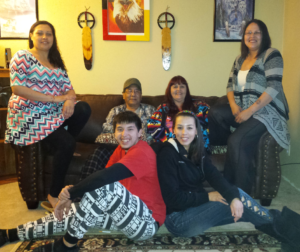
Mazaska Owecaso Otipi Financial (Mazaska)
Pine Ridge Housing Loan Fund Approves Loan for Storm Shelter Mazaska Owecaso Otipi Financial (Mazaska), a housing loan fund based on the Pine Ridge Indian Reservation, recently approved a loan for home repairs and building a storm shelter (basement). Borrower Eileen Whirlwind Horse explained, “Mazaska’s home improvement program helped me repair my home and also build a storm shelter (basement).” She stated, “I am very grateful for their assistance. Without it, I don’t know what I would have done.” Created in 2004, Mazaska is a certified Native Community Development Financial Institution (CDFI) that makes loans to qualified members of the Oglala Sioux Tribe living on, or in communities adjacent to, the Pine Ridge Reservation. Mazaska’s vision is to help the Lakota Oyate (community) regain their rightful status living in a clean, comfortable, safe and sustainable environment by providing homeownership opportunities. Mazaska uses the funds it raises to provide mortgage loans, home rehab loans, credit builder loans, and interim construction loans. “While most of Mazaska’s loan are for home purchase, I’m glad that Mazaska has started to make home improvement loans,” stated Colleen Steele, Mazaska’s executive director. “They are meeting a real need in our community, and by funding storm shelters, we can help community members improve the safety of their homes.” In order to qualify for a housing loan from Mazaska, potential borrowers must complete an application, meet qualification requirements, take financial education and homeownership classes, and work with a loan officer.
Native American Community Development Corporation

Thank you NACDC for the financial help and making it possible to follow this dream. I’ll share a bit of my story so others may learn how to start a small business. I worked intently with a local artist (Gerald Trombley) to draw the small girl in each tin. This drawing came to my mind as an inspiration to write a children’s book. But in time I decided to use the drawings to add an additional line to my “All Natural Herbal” business. “Red Root Herbs”. With this in mind I chose to purchase a small round tin to hold a new line of products. Mind you, I had begun by spending hours and days searching for companies who offered quality and price efficient products that I could financially afford. I tried my best to hire our local people as well as utilize American made products. However this was not always possible to start this small business, so I searched the world on the internet. I looked everywhere to find a local Graphic Designer to design the tin and box. I wanted the design to compliment my culture. I chose the name “Naamoo” as it translates to “Bee” in the Blackfoot language… the base of my product is Beeswax. After several months I finally found a company (Odesk) online that hires people all over the world to do many things. I really lucked out to find a gal in Bulgaria who I worked with over the last several months to get just the right design. This was time consuming and she was very patient with my many ideas. We went back and forth each day, and in the long run… together we finally accomplished a great design. After a full 9 months and searching for just the right tin to put my herbal product in (learned metric sizes) I then came across a company in China and once again lucked out and found just the right gal who I worked with to find me the right tin and in time her company placed the label and information on each tin. I also had to spend time in finding barcodes, patients and additional information, I wanted to go on the box. Now it was time to find a company that would design the box to fit the small tin in, and once again I found an amazing gal with a packaging company in Japan who helped me over the course of two years to get just the right box with the design. She had already begin to correspond with my graphic designer in Bulgaria, the tin company in China to get the right size box and design. By now we were all working together, like old friends to insure the packaging was attractive. Like old friends we had our moments of frustration and I am embarrassed to say, a little anger on my part. God bless these patient people because we learned together. This is what made all of my business dream come to fruition. I went to the NACDC office and talked with another very kind lending officer (Patty Gobert). She helped me with a loan to make this dream possible. She was extremely helpful when I found I didn’t have the money to pay for shipping, so she gladly gave me another small loan for this. I found it very difficult to learn all about shipping from other countries. This was the most stressful part of this business. I learned it cost a lot of money to have the products shipped by boat and once the items got to the port of Seattle I had to find what is called a forwarding agent for the items to clear customs (very expensive) With an additional cost they helped me find a trucking company to deliver the packages to my home. All 48 boxes on two crates. All together this took around 2 months and nearly $3,000 shipping from China to my place of business. I don’t think friends and family quite knew what I was talking about when I would share my excitement, frustration and story about my new packaging adventure. However they were there to listen. I’m thankful for their support, especially my Son-in-law…who would cuss when I became upset over the shipping process. Now that the packaging has been delivered I may have to hit the ground running to create each product that goes inside. “All Natural” Medicinal, and Aromatherapy Herbal Balms. Excited to say the least. From the Blackfoot reservation to Bulgaria, China, Japan we finally got it done. I can take great pride in my product as well knowing it is possible for others to do follow their dream to create a small business. All it takes is a lot of patience and hard work which can be a really fun adventure. All together this venture cost around $18,000 but once I get to selling to retail outlets and mail order I will make a lifestyle that will not only help me financially but will enhance the lives of others. I will also have a business to share and pass on to my children. I am sending a photo of the packaging products that I have spent nearly 3 years planning, designing and working nearly every day on. I now have an excellent product that I can be proud of. Thank You NACDC for making my business venture possible.
Pauline Matt prepares a batch of deep healing skin salve in her home outside Browning. The salves are the result of two years of gathering, drying, extracting and blending plants. Photo Courtesy of Montana Native News Project.
Native American Development Corporation and Montana Community Development Corporation
Wylon and Beth Plain Feather and Walter and Sheri Duffield took a courageous leap in 2009. In the middle of a recession, they opened Plain Feather Construction (PFC), a construction and excavation business in Billings, Montana. To launch their business, the partners leveraged their talent, experience, and excellent tribal connections with a state certification as a Disadvantaged Business Enterprise, which is available to minority and disabled business owners.
The business moved along steadily until the spring of 2011, when massive flooding left much of the town of Crow Agency underwater, and PFC was called upon to repair the damage. This launched PFC’s growth and continued contracts with Crow Agency, but it also increased PFC’s heavy equipment needs. At first, rental equipment filled this need, but as demand and rental costs continued to grow, the company needed to purchase their own equipment.
As ![]() a relatively new business with few assets or collateral, PFC was not eligible fo
a relatively new business with few assets or collateral, PFC was not eligible fo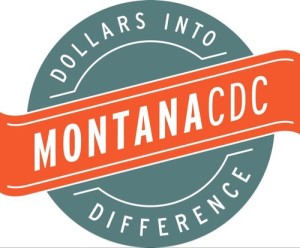 r a bank or equipment loan, so they turned to the Native American Development Corporation (NADC) in Billings, a community development lender that specializes in lending to Native American-owned businesses. Montana CDC and NADC have a strong partnership, so when NADC was not able to provide all of the financing that Plain Feather needed, they turned to Montana CDC for a partnership loan. Looking at the borrowers’ industry experience and good contracts with Crow Agency, NADC and Montana CDC were able to provide a partnership loan that allowed PFC to purchase the much-needed equipment and acquire a healthy line of credit to ensure that the business will have the means to stay agile in the face of future opportunities.
r a bank or equipment loan, so they turned to the Native American Development Corporation (NADC) in Billings, a community development lender that specializes in lending to Native American-owned businesses. Montana CDC and NADC have a strong partnership, so when NADC was not able to provide all of the financing that Plain Feather needed, they turned to Montana CDC for a partnership loan. Looking at the borrowers’ industry experience and good contracts with Crow Agency, NADC and Montana CDC were able to provide a partnership loan that allowed PFC to purchase the much-needed equipment and acquire a healthy line of credit to ensure that the business will have the means to stay agile in the face of future opportunities.
Northwest Native Development Fund
In November of 2014, Theresa Desautel saw an opportunity. The Colville Tribes had just opened a brand new multi-million dollar government center that would house the entire Tribal administration. Hundreds of employees would be working in the new, state-of-the-art building. All those employees needed to eat.
Mrs. Desautel-Gilcrist approached the Tribe with a proposal to operate a cafeteria in the new building, offering healthy, tasty fare for breakfast and lunch. The new cafeteria would be operated by a private person, a Tribal member, rather than the government. The Tribal administration liked her idea and said, “Yes” to her proposal.
There was one problem. Mrs. Desautel-Gilcrist needed start up capital and some help with her business plan. The Northwest Native Development Fund has established itself as the “go to” local organization for both funding and business expertise for budding native entrepreneurs. Theresa turned to the Northwest Native Development Fund for help and the staff at NNDF went to work helping her make her dream come true.
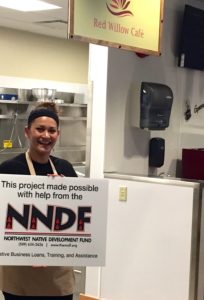
Theresa Desautel with Red Willow Cafe
The Executive Director of the NNDF, Ted Piccolo, noted some of the challenges Theresa faced, “Revenue projections for restaurants are difficult. Projections for a café, on a Reservation, in a brand new building of this size are even more difficult,” he said, “but things are always easier when the owner dives right into the project and Theresa really did.”
Entrepreneurs with a new business idea often find that start-up capital is extremely difficult, and often impossible, to get. Trying to get that kind of financing for a Tribally owned building on an Indian Reservation adds to that challenge. It most often entails more difficulties than an outside bank can address. However, the Northwest Native Development Fund was established to meet challenges just like this and has built itself upon doing those difficult deals. The specialized vision of the NNDF allows it to see true potential, accurately assessing the capabilities of the prospective native entrepreneur and then providing the financing needed.
Piccolo said, “In the case of Red Willow Café’, the market was there. The customers were right there in the building. The owner, Theresa, was burning the midnight oil leading up to the opening and the Tribal government administration really wanted a private individual in there who could service their employees. There was just many reasons a financing entity in the right place, with the right philosophy of lending, would take the opportunity to partner with Mrs. Desautel-Gilcrist.”
Eight weeks later the Red Willow Café’ opened its doors. Inside were 5 new employees and a whole new line-up of foods for the Nespelem area including healthy salads, sandwiches, soups, and smoothies. It might have seemed normal for Seattle, but for this small proud community located in the heart of the Colville Indian Reservation it is new and exciting. Very exciting.
Thank you, Northwest Native Development Fund, for creating access to capital for small business owners in the Pacific Northwest!
Sequoyah Fund
For the past 3 years students at New Kituwah Academy have been bringing money to school to deposit into their savings accounts, but on March 10th they got a behind the scenes tour of where that money is kept. The tour is a part of the Kituwah Savings Program, a project developed by Sequoyah Fund to start kids thinking about money and saving at an early age. “We were thrilled to partner with the Sequoyah Fund to invite the students of New Kituwah Academy to join us for visits to the bank,” said Michelle Cochran, Sales and Service Representative at First Citizens Bank. “I hope it was a fun and informative day for the children to learn more about savings and how to make their money grow. We at First Citizens Bank look forward to continuing to help them achieve a lifetime of financial success.”
The visit, for all students in Kindergarten through 6th grade, allows access to part of the bank not always seen. Students are able to peer behind the big vault doors, talk to customers in the drive thru, help bank employees count money, and most importantly make their deposits into their savings accounts.
Since 2013, 47 students at New Kituwah Academy have been regularly contributing to their savings accounts through bimonthly deposit days where First Citizen and Sequoyah Fund staff visit the school to take deposits and talk to the students about money and savings. New Kituwah Academy is an independent school of the Eastern Band of Cherokee Indians where all instruction is done in the Cherokee language. Most students have been attending the Academy since infancy. In total there are approximately 60 students enrolled in K-6th grade. For the savings program, Sequoyah Fund works with staff and the students to discuss both the traditional and modern concepts of savings and how money works within the Cherokee community. Students also set yearly goals, how much they want to save, and what they are saving for.
When the school year ends this May participants will have contributed over $5,5600.00 to their accounts. To incentivize the savings, Sequoyah Fund seeds each new account with $25 and adds an additional $25 if students meet their savings goal, making 10 $5 deposits between September and April each year. In total, Sequoyah Fund has contributed $2,100.00 to the program.
For most students the annual bank visit is their first time at a bank, but they handle it like professionals, forming lines at the teller counter, counting their money, and receiving their deposit slips. Then it is story and snack time where the kids listen to Cochran as she reads a story about why it is important to save. A tour follows and each student learns how the bank keeps his or her money safe. They watch as an electronic bill counter quickly counts $500 but their favorite part is watching themselves on the security monitors. Checking their balances, several students find they have more money than they expected, so we talk about how interest works and how that is a benefit of using a bank.
“The bank visit was an important component to the program. The kids have been great about regularly bringing their money to the school for deposit days so it was important for them to see how they can continue saving outside of the program” says John Ross of the Sequoyah Fund. The Kituwah Savings Program is an ongoing program and adds new students at Kituwah Academy each year. “We want to provide the resources for Cherokee youth to be able to save and to understand why it’s important” adds Ross “and that includes continued support and education.”
The Kituwah Savings Program is a joint effort by Sequoyah Fund, First Citizens Bank, and New Kituwah Academy. Sequoyah Fund is a Native Community Development Financial Institution (CDFI) serving the far western counties of North Carolina.
Wind River Development Fund
Heavy Eagle Teepee Rentals, owned by Lloyd Tillman Jr., is an existing business that operates from the Wind River Indian Reservation. The Wind River Development Fund has provided services to Lloyd for three years, including: lending, business and consumer assistance. Lloyd participated in and completed the IDA program that the Wind River Development Fund sponsors by matching $3/1. Lloyd has since used the proceeds to improve his business by paying off his loans and to make purchases to expand/improve his business.
